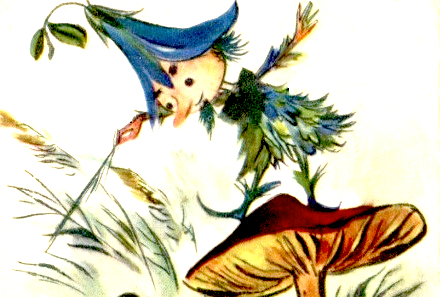Of Sneaky, Creeping, Thieving Little Creatures
 Sometimes when I look at the moronic stuff that is written in Slavic academic literature, I begin to wonder whether low-IQ folks somehow unable to find employment end up synecured at Slavic universities.
Sometimes when I look at the moronic stuff that is written in Slavic academic literature, I begin to wonder whether low-IQ folks somehow unable to find employment end up synecured at Slavic universities.
Czasami, gdy patrzę na kretyńskie treści napisane przez słowiańską literaturę akademicką, zaczynam się zastanawiać, czy ludzie o niskim IQ jakoś niezdolni do znalezienia sensownej pracy nie kończą na synekurach na słowiańskich uniwersytetach.
Take the word skrzat which means as much as a little woodland elf or a little hidden household creature, in the sense of a hearth protector. The word, attested, in all Slavic languages is, derived, from the German Schratt, traced to the Old High German scrato (also, schrat, schrate, schretel(in)). Trouble is that the word is not present in most Slavic languages but it is not present in other Germanic languages. So how is a word present in all Slavic languages derived from a word present in some Germanic languages? I mean, if the reverse were true, then our professors would have (usually correctly) concluded that the word is of Germanic origin. But, as already discussed, there is no parallelism here at all. The reason that Slavic scholars are willing to adopt these ridiculous positions is because they have extremely low self-esteem (which, in turn, might have something to do with their low IQs).
But, they say, there are Germanic words that are cognate! Really? Let’s see:
Weźmy słowo skrzat, które oznacza tyle, co mały leśny elf lub małe, ukryte stworzenie domowe, w znaczeniu chroniące palenisko. Słowo, poświadczone we wszystkich językach słowiańskich, pochodzi rzekomo od niemieckiego Schratt, wywodzącego się od starego wysokogermańskiego scrato (także schrat, schrate, schretel (in)). Problem polega na tym, że słowo to występuje we wszystkich językach słowiańskich, ale nie występuje we wszystkich językach germańskich. Jak więc słowo obecne we wszystkich językach słowiańskich może pochodzić od słowa występującego w niektórych językach germańskich? Mam na myśli, że gdyby odwrotność była prawdą, to nasi profesorowie (zwykle poprawnie) stwierdziliby, że słowo ma pochodzenie germańskie. Ale, jak już omówiono, w ogóle nie ma tu paraleli. Powodem, dla którego słowiańscy uczeni są gotowi przyjąć te absurdalne stanowiska, jest to, że mają wyjątkowo niską samoocenę (co z kolei może mieć coś wspólnego z ich niskim ilorazem inteligencji).
Ale, jak mówią, istnieją germańskie słowa, które są spokrewnione! Naprawdę? Zobaczmy:
więcej w anglojęzycznym oryginale: https://www.jassa.org/?p=12670
